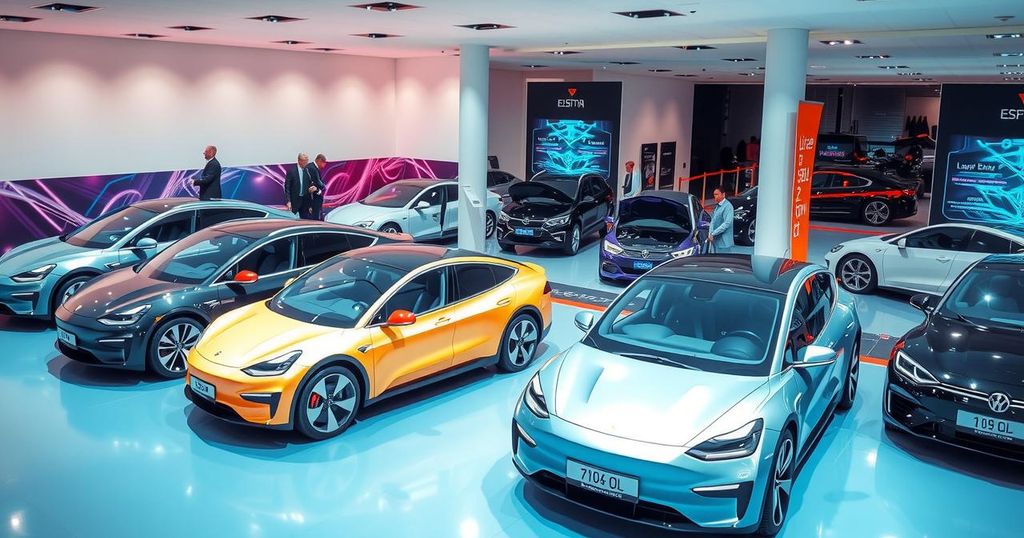Chinese Electric Vehicle Manufacturers Expand Globally Amid Domestic Competition

Chinese electric vehicle makers are aggressively expanding globally, competing against established brands through innovative technologies and affordable designs. Key players include BYD, Great Wall, Geely, and Chery, each with distinct strategies aimed at surviving domestic competition while pursuing international markets.
The automotive industry is experiencing a significant transformation as Chinese electric vehicle (EV) manufacturers swiftly broaden their global reach. Companies such as BYD, Great Wall, Geely, and Chery are not only catering to domestic demands but are also innovating with stylish designs and advanced technology to attract international consumers. These firms, distinct from state-owned enterprises, showcase a diverse range of origins and business strategies aimed at overcoming the intense competition prevalent in the Chinese market.
Great Wall Motors, known for its Haval, Wey, Ora, Poer, and Tank brands, is emphasizing global sales to counteract a nearly 15% drop in domestic sales last year, despite a remarkable 80% surge in net profit. The company has established manufacturing facilities in Russia, Thailand, and Brazil, where it competes against Toyota’s Hilux pickup truck with its own GWM Poer hybrid pickup. Great Wall has effectively transitioned to international production by acquiring plants from other automakers, highlighting the importance of achieving high production volumes to control costs.
Chery Automobile, a pioneer in overseas exports among Chinese automakers, claims to have sold over 15 million vehicles internationally. With more than 2.6 million vehicles sold last year, the company aims to reach 3 million by 2025, especially in developing regions like Turkey and Ukraine. Chery is actively expanding its manufacturing footprint in countries such as Russia and Spain and has formed strategic partnerships, including a joint venture with Jaguar Land Rover and collaborations with technology firms like Huawei and Alibaba.
BYD has emerged as a formidable contender in the EV sector, surpassing Tesla in total vehicle production by selling 3.52 million EVs, primarily due to its extensive range of plug-in hybrids. Recently, the Shenzhen-based company introduced a rapid EV charging system that can significantly reduce charging time to just five to eight minutes. BYD is recognized for producing both high-end and economical models, including the Seagull, which retails for approximately $12,000 in China.
Geely Auto, another significant player, began as a refrigerator manufacturer before evolving into a major automotive force. The founder, Li Shufu, has strategically acquired international brands, including Volvo and Proton, and developed partnerships to expand his company’s global footprint. Recently, Geely debuted its EX5 SUVs in the Australian and New Zealand markets, further enhancing its international presence. Additionally, Geely owns the premium EV brand Zeekr and has stakes in multiple automotive ventures.
Wuling, a collaboration among Shanghai’s SAIC Motor, General Motors, and Guangxi Auto, stands as China’s second-best-selling EV brand, with over 673,000 units sold. While it struggles to compete with the substantial market share of BYD, it remains a key player in the mini-EV segment alongside other brands like Nio, Xpeng, and Li Auto. Although state-owned manufacturers are also pivoting towards global markets, the intense competition within China drives the urgency for these companies to expand internationally.
In summary, Chinese electric vehicle manufacturers are rapidly expanding their global presence through innovative approaches and strategic partnerships. Companies such as BYD, Great Wall, Geely, and Chery are not only enhancing their production capabilities but are also focusing on affordability, advanced technology, and stylish designs to gain a competitive edge. As the domestic market becomes increasingly saturated and competitive, these manufacturers recognize the importance of diversifying their market reach to sustain growth and maintain their status as key players in the automotive sector.
Original Source: www.usnews.com




